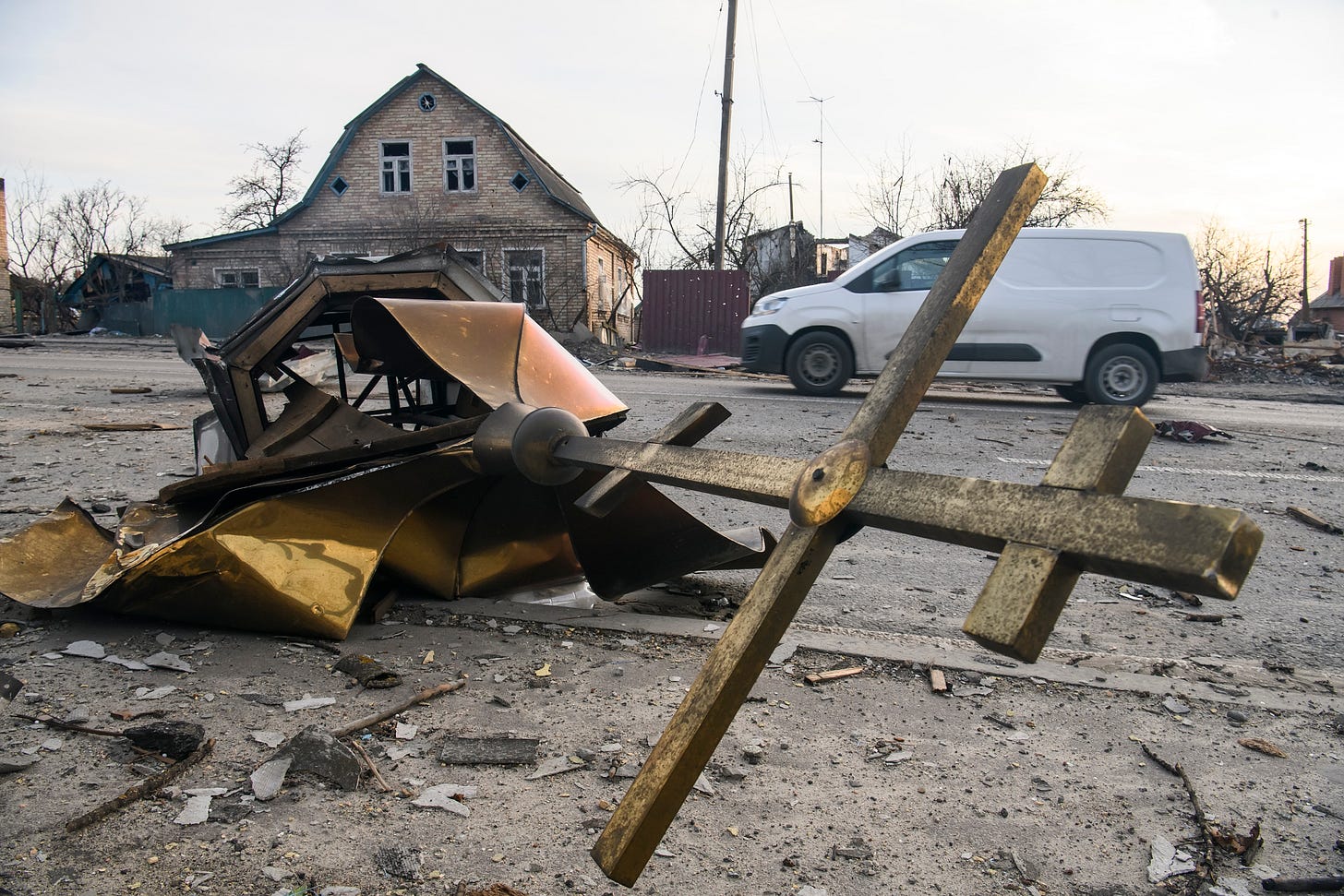
1. Russkiy Mir
One of the (many) alarming aspects of Russia’s invasion of Ukraine was the response of the Russian Orthodox Church: They were for it.
Two days before he launched a bloody invasion of Ukraine, Russian President Vladimir Putin sat alone in front of a camera and delivered a rambling, hour-long address. It outlined the ideological justification for what would ultimately become his “special military action” in Ukraine — an invasion that, as far as Putin was concerned, had more than a little to do with religion.
“Ukraine is an inalienable part of our own history, culture and spiritual space,” he said.
Two days later, Patriarch Kirill of Moscow, head of the Russian Orthodox Church, spoke to military leaders and published a statement in honor of Defender of the Fatherland Day. The cleric congratulated Putin for his “high and responsible service to the people of Russia,” declared the Russian Orthodox Church has “always striven to make a significant contribution to the patriotic education of compatriots,” and lauded military service as “an active manifestation of evangelical love for neighbors.”
This wasn’t a shotgun marriage of convenience. There is a deep and long-simmering alliance between Putin’s authoritarian nationalism and the Russian Orthodox Church’s integralist project:
Kirill, 75, a close ally of Russian President Vladimir Putin, sees the war as a bulwark against a West he considers decadent, particularly over the acceptance of homosexuality.
He and Putin share a vision of the "Russkiy Mir", or "Russian World", linking spiritual unity and territorial expansion aimed at parts of the ex-Soviet Union . . .
And Kirill’s support of the war wasn’t an unfortunate miscalculation that assumed a quick and bloodless victory. Six weeks into the war, with all of the carnage, with the clear evidence of war crimes and genocide, the patriarch of the ROC is two-fists in:
The head of the Russian Orthodox faith was quoted as saying on Thursday that his church and its faithful were holding back the antichrist. . . .
While he was not quoted specifically referring to Ukraine, Kirill's comments backed the Kremlin line on the war by implying that Russia's actions there were a forced response to a foreign aggressor.
"Why did external forces rise up against the Russian lands? "Why do they strive to destroy, divide, set brother against brother?" Kirill was quoted by Russia's RIA news agency as saying.
There is no defense—intellectual, theological, moral—which can be made for what the Russian Orthodox Church is doing. They are not accommodating evil. They are not cooperating with evil. They are actively summoning evil into the world and doing so in the name of Christ.
The fact that Kirill and his co-religionists are not the first Christians to do so is not a a mitigating circumstance.
2. RUSSIAN-Christianity
A month ago, Cathy Young wrote about the weirdness of Patriarch Kirill blaming Russia’s need to invade Ukraine on . . . the gays:
But in a Sunday sermon, Patriarch Kirill, the head of the Russian Orthodox Church, offered a startling new explanation that is sure to resonate with the Sohrab Ahmari wing of the modern American right: It was to save Eastern Ukraine from the gays.
Here’s an excerpt from one Kirill sermon on the subject:
What exists in the Donbas is a rejection, a principled rejection of the so-called values that are now being offered by those who lay claim to global domination. Today, there is a certain test for loyalty to that power, a certain pass into that “happy” world, the world of excessive consumption, the world of illusory freedom. Do you know what that test is? It’s very simple but also horrific: it’s a gay parade. The demand to hold a gay parade is in fact a test for loyalty to that powerful world, and we know that if people or countries resist this demand, they are excluded from that world and treated as alien.
As Cathy noted, this is a theme he returns to often:
During his fifteen-minute sermon on the Eastern Orthodox holiday known as Forgiveness Sunday (the last day before Lent), the patriarch did not say a word about fellow Christians under fire in Ukraine outside Eastern Donbas. He did, however, return more than once to the evil of gay parades and to his claim that holding such parades was a requirement for membership in the “club” of powerful countries. The patriarch also asserted that resistance to such demands is “suppressed by force,” which amounts to “forcible imposition of a sin condemned by divine law” and which means that the war for Ukraine is “not a physical but a metaphysical struggle.”
Also of note: Such language is almost indistinguishable from how many (most?) white evangelical Protestants and right-wing American Catholics talk about modern society.
Pete Wehner, David French, and Russell Moore have been writing about this phenomenon for a few years now: When Christianity and nationalism collide, it is always the nationalism which becomes the dominant trait.
All three of them are Protestants, but the same is clearly true in the Catholic Church. The Catholic Church is, at least aspirationally, a universal institution. But we are quickly approaching the fork at which American Catholicism becomes zoologically distinct from Roman Catholicism.
This phenomenon is both toxic to Christianity and dangerous for the world.
American Christians are not yet in the place of abject nationalism where every single theological belief is sublimated to the political imperatives of national identity.
But we’re not all that far from it, either.
Look at Eric Metaxas. Look at the mingling of religious iconography and raw political will to power


